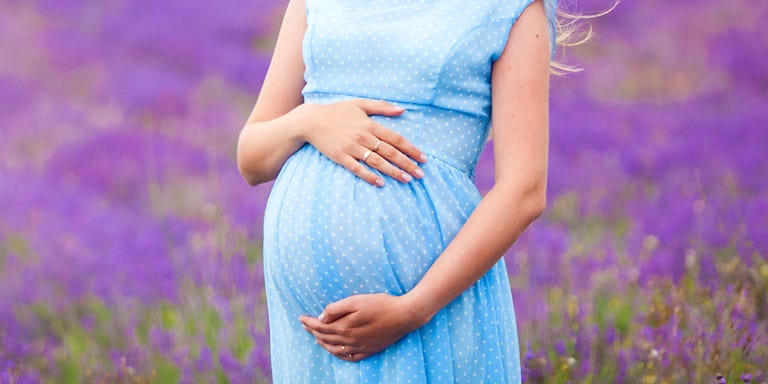
When I found out I was pregnant in September, I knew my body would change. My stomach was going to get bigger, I’d feel aches and pains I’d never experienced before, and I could get morning sickness. And while I was lucky to avoid some of the more common symptoms many women experience during pregnancy, I did go through a few other changes that I didn’t expect. Here are five weird things that happened that nobody warned me about, but consult your doctor if you’re concerned about any changes you’re experiencing.
Your gums might bleed
Just a couple of months into my pregnancy, I started to notice that I would spit out a mouthful of bright red blood at least once a week while brushing my teeth. For a while, I assumed something was up with my toothpaste, or maybe I just needed to up my oral hygiene regimen. Then I went to the dentist.
As soon as the dental hygienist knew I was pregnant, she asked, “Are you experiencing excessive gum bleeding?” I’m pretty sure I yelled, “yes!” with a mouthful of gauze.
I’m pretty sure I yelled, “yes!” with a mouthful of gauze.
Turns out, it’s totally normal.
“Pregnant women have higher levels of progesterone, which causes blood vessels to become larger, leakier, and closer to the surface of your gums,” says Dr. Aaron Yancoskie, professor at Touro College of Dental Medicine and a board-certified oral and maxillofacial pathologist. “Because of this, the blood vessels come into contact with bacteria in your mouth more easily, leading to inflammation and bleeding.”
According to Yancoskie, a pregnant woman should continue to be diligent about her normal dental routine — brushing and flossing with a soft-bristle brush twice a day — and consider adding in a non-alcohol-based mouthwash to ensure sensitive gums don’t become infected. Additionally, she should visit a dentist for a cleaning during pregnancy, a completely safe procedure that often can be done without x-rays.

“While it is exceedingly unlikely that the baby would be put in danger by a dental cleaning,” said Yancoskie, “the general recommendation is that expecting mothers should delay all elective procedures, including cleanings, until after the first trimester.” And since the mother might feel uncomfortable in the dental chair during the third trimester, the second trimester is the best time to get a dental cleaning.
Although it varies from mother to mother, exaggerated gum bleeding may subside following delivery.
Your gallbladder can malfunction
You hear about heartburn, indigestion, morning sickness, and even Hyperemesis Gravidarum thanks to Kate Middleton. But about 20 weeks into my pregnancy I started to feel a painful cramping sensation in my upper-right abdomen every time after I ate. Sometimes, the pain would wrap around to my back. I brushed it off for a while, but it only got worse.

Eventually, my ob-gyn referred me to a gastroenterologist, who concluded I had gallbladder sludge (basically like the gravel version of gallstones), causing it not to function properly. As someone who ate very healthy, worked out, and hadn’t gained a ton of weight, I had no idea why this was happening.
“It’s just because you’re pregnant,” my doctor told me. In fact, gallbladder removal is the second most common non-obstetrical surgery during pregnancy.
“Increased estrogen during pregnancy increases the amount of cholesterol in your bile,” says Dr. Mustafa Hussain, a gastroenterologist at the University of Chicago Medicine. “This causes the bile to crystallize into stones. Estrogen also reduces the ability of your gallbladder to squeeze, so the bile sits around more. The gallbladder squeezes when you eat, causing pain in the right upper part of your abdomen.”

This pain can vary from woman to woman. Some need their gallbladders removed during pregnancy, others can wait until after, and, as in my case, with some women it simply goes away on its own.
You can get congested
Since most of my pregnancy took place during the fall and winter, I assumed my regular sniffles were just a byproduct of the weather. But I noticed I was getting congested every couple of weeks, and my typical remedies like drinking more water weren’t really helping. I didn’t feel like I had a full-blown head cold but I often had to blow my nose or woke up with a scratchy throat.
“Estrogen hormones increase in pregnancy, causing the lining of the nasal passages to swell and produce more mucus, leading to women having congestion and a stuffy nose, a condition called ‘pregnancy rhinitis,’” says Dr. Amos Grunebaum, ob-gyn and medical expert for Fairhaven Health. “It’s a not so serious condition. However, symptoms of rhinitis can be similar to more serious conditions like allergies or sinus infections.”

Luckily, my symptoms weren’t too severe and eventually went away as my due date approached, which is pretty typical among pregnant women — although Grunebaum says nobody knows exactly why. If you’re experiencing this symptom, see a physician for proper medication and to ensure nothing more serious than pregnancy rhinitis is going on.
You may drool excessively
My husband showed me a picture he took of me while I was napping, and I was horrified by what I saw: My face was covered in drool. While he thought it was hilarious, I was stunned a human could produce so much saliva.
While he thought it was hilarious, I was stunned a human could produce so much saliva.
I was curious if this somehow was related to my pregnancy, because so many other weird things were happening to my body.
Like congestion, excessive drooling is likely related to an increase in estrogen, according to medical experts. An increase in blood flow can lead to more saliva being produced. “The increased production and buildup of saliva in the mouth during pregnancy are called ‘ptyalism gravidarum,’” says Grunebaum. “This is often uncomfortable and distressing to pregnant women, but it’s not a condition to be worried about.”
Although there’s no magic treatment, you can try different approaches to decrease saliva production, including chewing gum, brushing your teeth regularly, and using mouthwash, says Grunebaum.
It can feel like you’ve been kicked in the crotch
I was feeling pretty good as I settled into my third trimester. I was still going to the gym, had energy, and had gotten over the gallbladder pain. Then something new started happening: I felt like someone was kicking me in the crotch daily. The pain would be so bad that sometimes it would wake me from my sleep if I rolled over. I had to halt my workouts, stop wearing heels, and I waddled when I walked.
It was only during a prenatal yoga class, when I started to describe my symptoms, that I realized I wasn’t alone in my suffering. “You’re part of team pubic symphysis,” exclaimed my yoga teacher. Not only was there a name for what I was feeling, but one-quarter of the women in the room were experiencing it, too.
Not only was there a name for what I was feeling, but one-quarter of the women in the room were experiencing it, too.
“Symphysis pubis dysfunction can cause pain in the front pelvic area and ‘clicking’ of the symphysis pubis, a joint in the pubic bone, or sacroiliac joint, the joint between the sacrum and the pelvis,” says Dr. Azmina Bhayani, fellow with Physicians for Reproductive Health. “There are many possible causes of SPD, but one is thought to be due to increasing levels of the hormone relaxin, which helps ligaments become stretchy in preparation for childbirth. Too much of this hormone can cause instability in the joint.”
That’s good news for childbirth — bad news for the weeks leading up to it.
Other causes, according to Bhayani, can include the position of the uterus and the stress it places on ligaments, anatomic abnormalities, misalignment of the pelvis, a history of injury, and strenuous work. Pelvic pain also can be a result of UTIs, STIs, Braxton Hicks contractions, and musculoskeletal conditions. Based on your medical history, physical exam, and sometimes a few lab tests, your medical provider can work with you to diagnose your pelvic pain.

If the pain is due to musculoskeletal conditions like SPD, it can start at any point in pregnancy, but it more commonly starts late in the second trimester or early in the third, when the uterus is growing and putting strain on ligaments. It can last through the end of pregnancy or even persist beyond childbirth, but the exact duration varies by individual. Avoiding activities that cause the pelvic pain and engaging in physical therapy helps for both conditions, according to Bhayani.
While pregnancy is different for every woman, these bizarre symptoms certainly caught me off guard. It’s easy to feel like you’re going crazy as your body changes, but don’t be afraid to talk to your doctor about any symptoms you’re experiencing.
Source: Read Full Article
